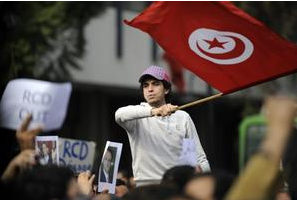By Daniel N.
The Islamist-led government has one year to instill optimism over Tunisia’s battered economy, or else risk failure in the next elections

After months of uncertainty and fears of an Islamist takeover after elections, the nation which kicked off the “Arab Spring” is finally showing signs of stability. The National Constituent Assembly (NCA) led by the moderate-Islamist Ennahda party, recently concluded a weeklong marathon session, establishing bylaws and electing the President. In the capital, signs of tension have been limited to protests by fringe liberal and Islamist groups, each fearing that the country’s leadership will not work to ensure their respective ideologies. Unfortunately, the recent calm in the capital is by no means guaranteed, and the dire economic situation is already starting to stir anger beneath the surface.
Tunisia is unique to the Middle East and North African region for its societal views on political Islam and adherence to liberal culture. The main dividing issues in the recent elections were economic policies and the role of religion in governing affairs, making Tunisia’s political discourse more comparable to that of Western Europe than North America. Like in the West, it will be the current government’s economic policies- not its religious ideology that keeps it in power, meaning that the ruling coalition only has one year to improve the situation before the next round of elections are slated to be held.
For Tunisia’s Islamist-led unity government, the challenge of improving the economy by this time could not be greater. Unlike its neighbors to the east and west, Tunisia has considerably few economic staples, namely with its relative low amounts of natural resources. During the rule of Ben Ali, Tunisia enjoyed a vibrant tourism market, which subsequently took a huge hit amidst the uncertainty of the revolution.
The government must therefore focus on foreign investment to rehabilitate the economy. Despite notable investments from economic powerhouses in the Persian Gulf, Tunisia still suffered from a 35% drop in foreign direct investment (FDI) from 2010 to 2011. To bring back FDI, the government must focus on improving poorly maintained infrastructure in outlying areas, liberalizing investment policies, while managing the budget in a manner which will prevent the public sector from striking. The situation in most areas of the country except for the capital indicates that much work is needed. In the central town of Sidi Bouzid, in which the Jazmine Revolution erupted, poverty and unemployment are rampant, while a notable absence of security forces sparked a rise in civil unrest.
While the new government enjoys broad political support from moderate secular parties, Tunisia’s powerful unions still pose a threat to any liberalization efforts necessary to attract investment. In September 2011, an attempt by the government to ban police unions sparked an uproar in the capital, while the powerful General Tunisian Worker’s Union (UGTT) played an influential role in both the revolution and the recent elections.
Unfortunately for the Ennahda party, time is not on its side. The mandate of recent elections provides the new government with one year in which to develop a constitution, after which new elections will be held. In addition, keeping tensions low during constitutional deliberations, the Ennahda party must also prove to the Tunisian people that they deserve to be re-elected by improving the economy. With an unemployment rate of 18%, protests are already beginning to spring up in various outlying areas, suggesting that the people are already beginning to lose patience.
The current government can only hope that the situation is not worsened by any number of factors which it cannot control. These include the emergence of an emboldened radical Salafist movement from within the country, instability in neighboring Libya, and not to mention a dire economic situation in Tunisia’s primary trading partner—Europe. With the Governor of Tunisia’s central bank stating that economic recovery will take at least five years, Ennahda’s reelection hopes may indeed be just a pipe dream.